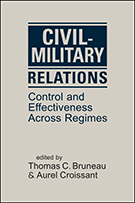Thomas C. Bruneau and Aurel Croissant, editors
How does civilian control affect military effectiveness? Can a balance be achieved between the two? In-country experts address these questions through a set of rich comparative case studies. Covering the spectrum from democracies to authoritarian regimes, they explore the nexus of control and effectiveness to reveal its importance for national security and the legitimacy of both political order and the military institution.
Thomas C. Bruneau is distinguished professor emeritus of national security affairs at the Naval Postgraduate School.
Aurel Croissant is professor of political science at Ruprecht-Karls-University.
Also of interest:
Mobilizing Force: Linking Security Threats, Militarization, and Civilian Control by David Kuehn and Yagil Levy, eds.
"A thorough and methodical fact-seeking project…. The book provides readers a strong basis on the current state of the field, while highlighting theoretical gaps that must be addressed."—Juan Merizalde, Democracy and Security
"Bruneau and Croissant have put together a much-needed update to the Huntington canon.... The impressive scholarship featured in this volume elevates the discussion of civil-military relations generally and provides a springboard for further research at civilian and military learning institutions." —Captain Paul Shemella, US Naval Institute's Proceedings
"An impressive piece of collective scholarship, one that should attract the attention of a broad audience of students, experts, and practitioners in the civil-military field." —David Pion-Berlin, Armed Forces & Society
"This carefully conceived collection focuses on an important, but often overlooked, aspect of civil-military relations: military effectiveness. Insightful and informative ... the chapters form a cohesive whole. Those interested in military politics, from the novice student to the seasoned expert, will find the book useful and thought provoking." —Zoltan Barany, University of Texas at Austin






